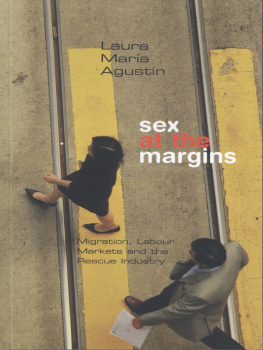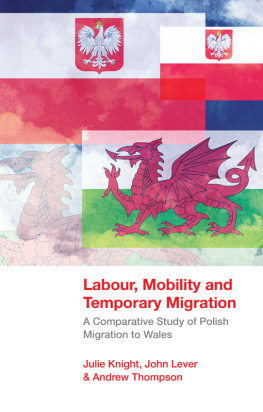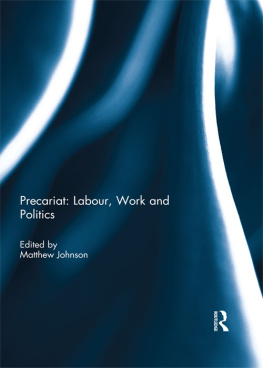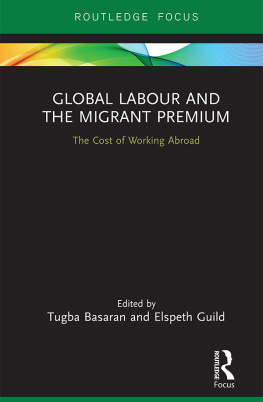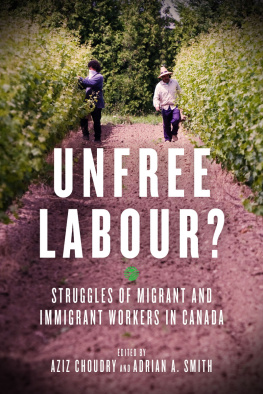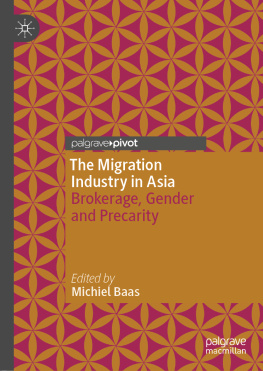
Praise for this Book
Sex at the Margins elegantly demonstrates that what happens to poor immigrant working women from the Global South when they leave home for sex is neither a tragedy nor the panacea of finding the promised land. Above all, Agustn shows that the moralising bent of most government and NGO programmes has little to do with these womens experiences and wishes. This book questions some of our most cherished modern assumptions, and shows that a different ethics of concern is possible.
Arturo Escobar, Kenan Distinguished Professor of Anthropology and Director, Institute of Latin American Studies, University of North Carolina
In restoring those living on the fringes of western societies to their full humanity, this invigorating book undermines our stereotypes and provides a challenging but unforgettable picture.
Jeffrey Weeks, London South Bank University
About the Author
Laura Mara Agustn studies cultural and postcolonial issues linking commercial sex, migration, informal economies and feminist theory. She currently lives in London, researching the situation of migrant workers in the sex industry.
SEX AT THE MARGINS
Migration, Labour Markets
and the Rescue Industry
Laura Mara Agustn

Sex at the Margins:Migration, Labour Markets and the Rescue Industry was first published by Zed Books Ltd, 7 Cynthia Street, London N1 9JF, UK, and Room 400, 175 Fifth Avenue,New York, NY 10010, USA
www.zedbooks.co.uk
Copyright Laura Mara Agustn 2007
The right of Laura Mara Agustn to be identified as the author of this work has been asserted by her in accordance with the Copyright,
Designs and Patents Act, 1988
Designed and typeset in Perpetua and Eurostile by Long House Publishing Services, Cumbria, UK Cover designed by Andrew Corbett
All rights reserved. No part of this publication may be reproduced, stored in a retrieval system, or transmitted, in any form or by any means, electronic or otherwise, without the prior permission of Zed Books Ltd.
A catalogue record for this book is available from the British Library Library of Congress Cataloging-in-Publication Data available
ISBN 978 1 84813 500 0
CONTENTS
Thanks to everyone whose conversations and writings have given me pleasure and sparked my thinking over the years and to those who welcomed me into a social movement. Special thanks to Arturo Escobar, Pat Crain, Julie Graham,Tony Bennett, Pam Beach, Flix Tremio, Priscilla Alexander,Wendy Harcourt, Carol Leigh and Pocho.
Laura Mara Agustn
Granada, Spain, and Leicester, UK
To those who leave home
1
SEXUAL COMMOTION
Some years ago, on a trip to Australia and Thailand, I met five Latin American women connected to the sex industry: the owner of a legal brothel and two migrants working for her in Sydney, and two women in a detention centre for illegal immigrants in Bangkok. These five women were from Per, Colombia and Venezuela; they were from different strata of society; they were different ages. They also had very different stories to tell.
The brothel owner was a permanent resident in Australia. Her migrant workers came to Australia on visas to study English, which gave them the right to work, but getting the visa required paying for the entire eight-month course in advance, which meant acquiring large debts. The madam was very affectionate with them but also very controlling; they lived in her house and travelled with her to work, where she was teaching them the business. The outreach workers from a local health project did not speak Spanish.
Of the two women detained in Bangkok, one had been stopped at a Tokyo airport with a forged visa for Japan. She had been invited by her sister, who once worked illegally selling sex and now was an illegal vendor within commercial sex milieux.This traveller was deported back to Bangkok, the last stage of her journey, where she was imprisoned for a year before being sent to the detention centre. The second traveller was caught on camera in a robbery carried out by her boyfriend and others in Bangkok, after she had travelled around with them in other parts of Asia; she completed a three-year prison sentence before being sent to the centre. Her papers were completely false, including a change of both name and nationality.
Both detained women were waiting for someone to pay their plane fare home, but there were no offers. The womens complicity in events leading to their detention disqualified them from aid to victims of trafficking; not all Latin American countries maintain embassies in Thailand, and only one person from local organisations visiting the detention centre spoke Spanish. While the two new migrants in Sydney seemed to accept the work they had just begun doing, I sensed ambiguity and ambivalence about the language course on which their visas were based, and the size of their debts did not leave them any real choice about what jobs to take. Both appeared to be recent graduates of secondary schools. The migrant to Japan believed she had not been destined to sell sex, but her own upper-middle- class family had been involved in getting her the fake papers, and she was suffering considerable guilt about letting them down. The woman caught in the robbery, who was in her mid-thirties and from a working-class background, gave the impression that she had sold sex, but she did not appear to give much importance to it. Her eyes shone when she told me about the thrill of seeing places like Hong Kong and Singapore.
Numerous characters had participated in fixing up these womens journeys, including Pakistanis,Turks,Australians and Mexicans. On the surface, the stories have all the ingredients of exotic melodrama. But people who desire to travel, see the world, make money and accept whatever jobs are available along the way do not fall into neat categories: victims of trafficking, migrant sex workers, forced migrants, prostituted women. Their lives are far more complex and interesting than such labels imply.
Media Panic
An open space near a highway, at night. Cars continuously drive up, headlights shining on figures standing about who are scantily dressed, in high heels, thick makeup, wigs. Brief snatches of conversation, raucous laughter, taunts.
Scene from Pedro Almodvars Todo sobre mi madre Within seconds, most viewers guess whats happening in such a scene, which is depicted in the media most days of the week. This is what people call prostitution, buyers of sex approaching vendors who make themselves available in marginal urban spaces. The following treatment is not unusual:
French working girls lose their privileged role
Pariss sex trade is threatened by a new conservatism and a wave of East
European prostitutes.
Casual visitors to the Bois de Boulogne at night find they have wandered into a surreal enchanted wood. Among the trees gleam exposed flesh, bottoms and breasts are displayed in bizarre leather arrangements, thighs spring from high boots here almost all the prostitutes are men. Some have been operated on but most are pumped full of hormones and silicone.
Behind this carnivalesque scene is a rigid organisation. Each section of each alley relates to a geographical area Colombian, Brazilian, Peruvian, North African, Spanish, and so on.
References to carnival, risqu clothing, distinct nationalities, sex change and not least some loss Europeans are suffering because of migrants: these are the standard ingredients of stories about Europes sex industry. Another typical treatment invokes slavery:
Next page
